Don’t Have Negative Thoughts: The Story of the Classic Video Game 'Faxanadu'
Beginning a new ongoing series on the retro gaming era!
Editor’s Note: Kenny Huenik has been a kind social media acquaintance for a number of years and now an enthusiastic supporter of GOTD. I am very pleased and proud to begin featuring his writing on classic video games, a subject we need more of and which I too have some appreciation. The late ‘80s through the early ‘00s was my period as a gamer before I shifted most of my time to writing. Thus I’m thrilled to have Kenny immortalizing this nostalgic period in a series of pieces starting with this one.
Old video games can be weird. I love old video games. The weirdness is one of the things I like about them. That and nostalgia. One of my favorite games as a child was the epic action-role-playing game (RPG) “Faxanadu.” It isn’t a perfect game though, but these imperfections highlight one of the conundrums of playing old video games. For a retro gaming aficionado like me old games are both fun and a part of history. Old video games are exactly like an old book, or an old movie, they should be preserved. Too many times in the past works of art have been lost to time. We shouldn’t let that happen to video games. Yet what does it mean to really preserve something? With video games, this can get complicated.
Let’s take an adventure into a land of overly cautious corporate decisions, a really obvious glitch, a story that makes little to no sense, strange but uplifting affirmations, insane dialogue, gratuitous use of cigarette smoking and surprisingly considering all of these flaws what amounts to a really great and unique game. This is both a review of one of my favorite games for the Nintendo Entertainment System and a commentary on what “preservation” means in regard to video games as a piece of history and as art.
You return home from a long journey, exhausted. You enter your familiar hometown to find an unfamiliar and horrific scene. The town is depopulated, and people are hungry(yet there is no short supply of cigarettes). The townsfolk on the street tell you that you must talk to the king. They are adamant about the fact that you go directly to the king. You have to dodge several demonic-looking eldritch horrors, including what looks like pieces of meat with spikes protruding from them that have somehow occupied the center of town.
Once you get to the King, he informs you that these eldritch horrors including the spike-adorned meat are actually “Dwarves” and these dwarves have stopped water flowing from a sacred fountain and have poisoned the existing water. He then says:
“You are our last hope, I shall give you 1500 golds.”
Welcome to the world of Faxanadu.
And so you start your adventure, in a land where dwarves look like a large assortment of horrifying beasts, and where the currency is referred to very consistently as “golds.” It's a surreal game with a plot that is nearly impossible to follow, that is nonetheless very dialogue heavy for an 80s Nintendo game. Also, I think your character and every other character you can speak with is intended to be an elf, although there is no indication of this in the character models. Some of this confusion could come from the fact that the game is a spin-off of another game that was not released in North America titled “Dragon Slayer: Xanadu.” At the time no American child knew this. Yet the game seems to assume that everyone playing does know this. It is very confusing.
You walk through an expertly crafted world filled with medieval gothic towns, with a backdrop of a giant dying “world tree” as well as ruins and foreboding castles and dungeons. The people populating this world are largely morose villagers, often with a cigarette lazily hanging out of their mouth, they all look tired. You approach a woman in a smokey tavern and are given the sage advice of “listen to people.” It’s good advice in general, but is not helpful in the game, mainly because most of what the people say is absolute nonsense.
Interestingly and unique to Faxanadu when you die you are met with a text box that says “Don’t have negative thoughts” then you are transported to the last “guru” you spoke with, this “guru” looks similar to a medieval catholic priest. Your “guru” will state: “Remember your mantra.” followed by something like “blkIAAkgAkA?UddK!hhP?ldlR” or some other massive uninterpretable mixture of twenty-five characters symbols and numbers. It’s a password system, but the game doesn’t outwardly tell you this. Since there are lots of mistranslations and random gibberish that some characters say, it isn’t immediately clear that this is not just another bizarre translation error or glitch. It is also incredibly tedious to enter 25 characters that contain, capital, lowercase letters as well as numbers and symbols all with an NES controller. I remember as a child having papers with Faxanadu passwords written all over them, I honestly worried that if an adult found this out of context they might have questions about my sanity.
As you reach the poisoned fountains(there are actually many poisoned fountains) and climb the world tree it will be revealed that the “Evil One” turned the dwarves into monsters which is why the dwarves everyone is referring to do not look like dwarves. It's very easy to miss this plot reveal.
(that dragon looking thing is apparently a “dwarf”)
You will be able to gain experience, armor, weapons and magical spells. You pick up unique items and spells that help you unlock new areas. You even get the ability to fly with the “wing boots” and travel to a haunting location in the sky filled with eerie fog(a unique effect for a Nintendo game of that era.) You can even find a pendant that both the game manual and characters in the game tell you will increase your attack power, but instead, this item will disappointingly in fact decrease your attack power. You can never get rid of this pendant and if you have the misfortune of picking it up the game will be much harder from this point on.
Faxanadu was released in 1987 in Japan and 1989 in North America it was developed by Hudson Soft and published by Nintendo themselves. The game’s graphics are fantastic for the time, conveying a dark fantasy world in a way I don’t think any other Nintendo game from that era was able to do. You have a wonderful sense of progression. Every piece of gear you pick up modifies the way your character looks, so as you get more powerful you also look more powerful as well. The game takes both fast reflexes and a keen mind to complete. Rare for the time the game is non-linear, this is a game of exploration and problem-solving, not a game that merely moves from left to right, until a level is complete. In fact, Faxanadu has no levels, just one continuous world. Castlevania II and Metroid were contemporaries of Faxanadu that also employed this gameplay style, but I believe Faxanadu did it better than the other two. Its difficulty is high(especially if you pick up the stupid pendant) but not impossible. It’s a truly outstanding game in many respects. It certainly makes up for some of the poorly executed elements. The music is also superb.
Now objectively if you fix the pendant, add a save system that doesn’t include excruciatingly long “mantras” and fix the translation issues Faxanadu is a better game. All of these fixes could have been implemented by the developers of the game at the time, the technology existed then. The Legend of Zelda had a save system, other games had good translations. The issue is that back in 1989 once a game was released, that was it. Very rarely were revised copies ever produced. Interestingly one revision of Faxanadu was released but all it did was make the text more legible…so you could read the nonsense dialogue without straining your eyes.
So the debate amongst fans of Faxanadu is this: If you play a version of Faxanadu that is “fixed” are you playing a more or less “authentic” version of the game?
On the one hand, in 1989 none of us had the option to “fix” anything, we could only play what was given to us. Is playing some form of Faxanadu that is altered to fix the errors playing what the artists and developers of the game wanted us to play all along and thus more authentic? After all, a lot of what is wrong with Faxanadu was clearly unintended. Or on the other hand, is altering the game somehow spoiling the historical memory of the game and thus partaking in an “inauthentic” experience?
Before I give a non-answer on this incredibly trivial philosophical question, It gets more complicated. There are effectively two different versions of the game. In Japan, Faxanadu is essentially a different game, while the pendant glitch is still frustratingly present the game has a more coherent and dark storyline and Christian imagery is all over the game. In fact, for the American release, all Christian imagery was removed from the game. All mentions of the devil, of demons, or anything that could be construed as alluding to Christianity was removed.
The reason was that Nintendo was afraid of offending US Christians, they wanted their games to appeal to a wide audience and did not want to incur the wrath of the religious right in the US. In fact, Shigeru Miyamoto the creator of Mario, Donkey Kong, and Zelda amongst many others made a game in Japan called “Devil World” which was never released in North America due to fears that it would offend. At the time Nintendo was trying to build its brand in the US. Video games, especially consoles in the US at the time were primarily played by children, often games were sold in toy stores that had policies against anything remotely offensive. It is clear Nintendo of Japan didn’t know what might offend American audiences, so in the 1980s they proceeded with extreme caution erasing likely far more elements of the original game than they had to. This undoubtedly contributed to the game’s botched translation.
The people who made Faxanadu put a lot of love into the game. I am sure every element of the game was intentional, but corporate wanted a product that would reap maximum profit and not offend. So like many games from the time the final product was likely rushed and the original artistic vision of the game botched to some degree.
There are versions of Faxanadu now with all the glitches and translations fixed, with all the original Japanese art depicting crosses, rosaries, and statues of Jesus, and even with an easy-to-manage save system. It is a better game than the 1989 North American release. Yet this version loses something as well. It isn’t the same game you played as a child and it shows. There is something charming about the money being referred to as “golds” , something endearing about the townspeople and the game instructions themselves trolling you into picking up a cursed item that makes the game harder. Of the “guru” with a necklace that bears an exclamation point instead of a cross. Even the insanely long and case-sensitive password system awkwardly shoehorned into the dialogue of the game has some nostalgic value and charm.
Still, as long as the original game exists somewhere it is of course perfectly fine to play Faxanadu however you want. The original version warts and is all stashed away somewhere, the original intentions of the developers need to be preserved as well. Someday I hope to see the game remade with updated graphics, more options, and a truly authentic translation of the mysterious plot.
Even if the translation was to be cleaned up, I would still want a nice woman in the tavern to tell me earnestly to “listen to people.” I would still want the game to tell me after death “Don’t have negative thoughts.” This is actually the most important of all. Games have a tendency to taunt you when your character dies, in many Nintendo games you famously have to endure taunting laughter! Only Faxanadu tries to comfort you. It is that comfort that is one of the things that keeps me coming back to this game.


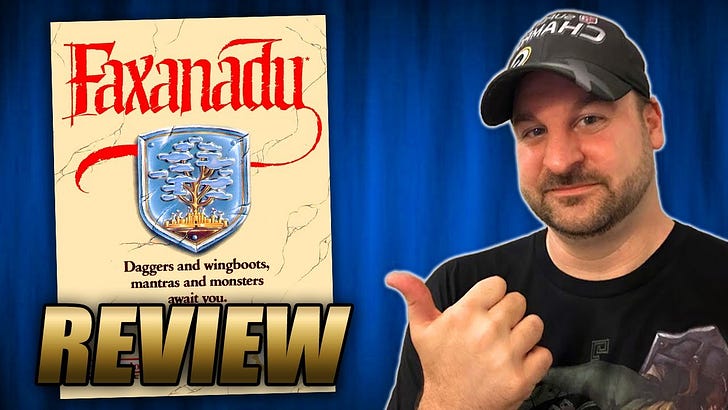


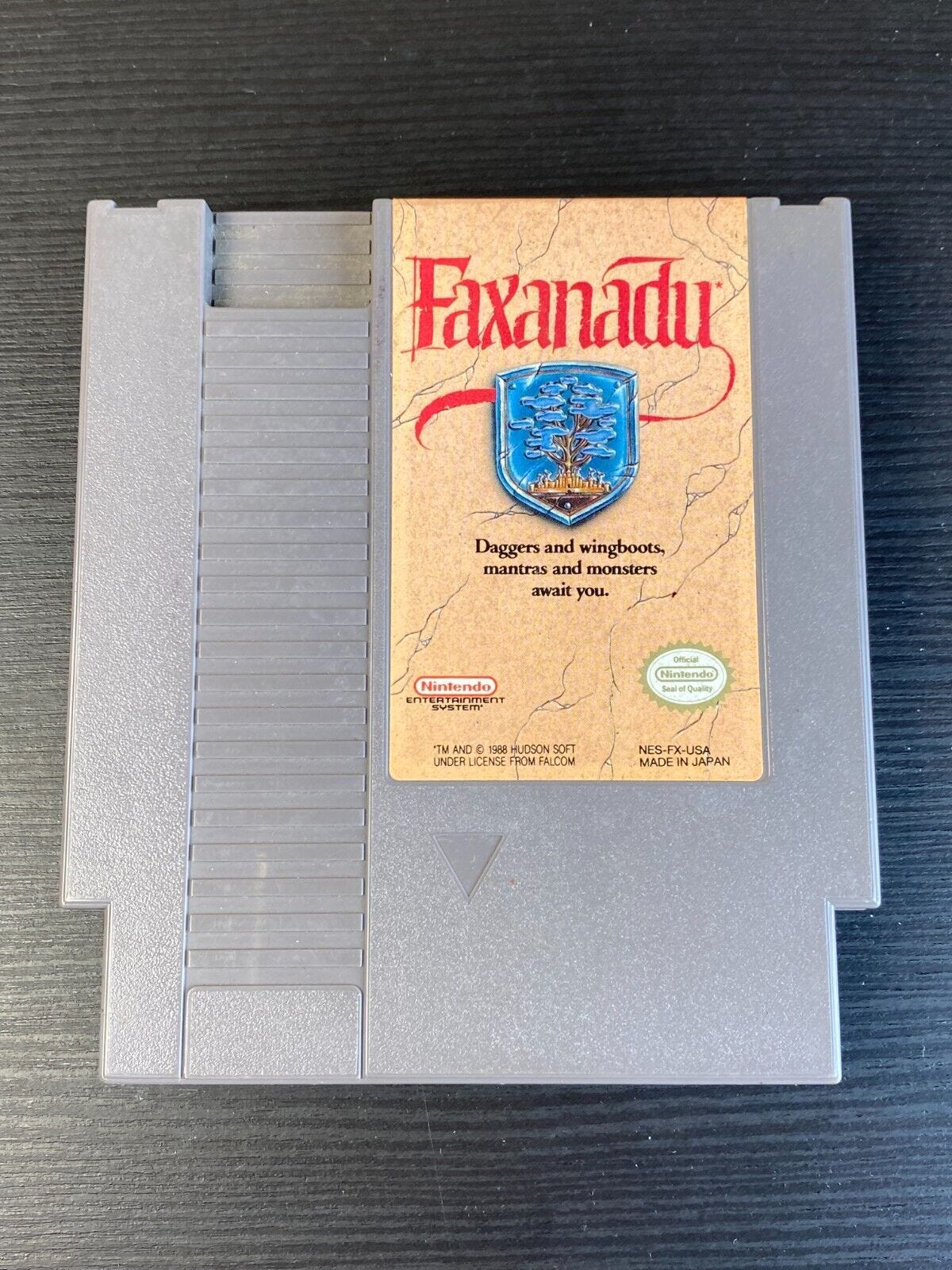

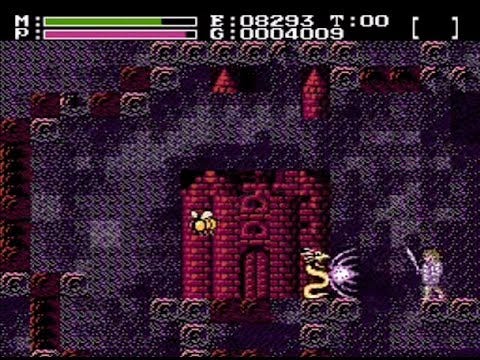

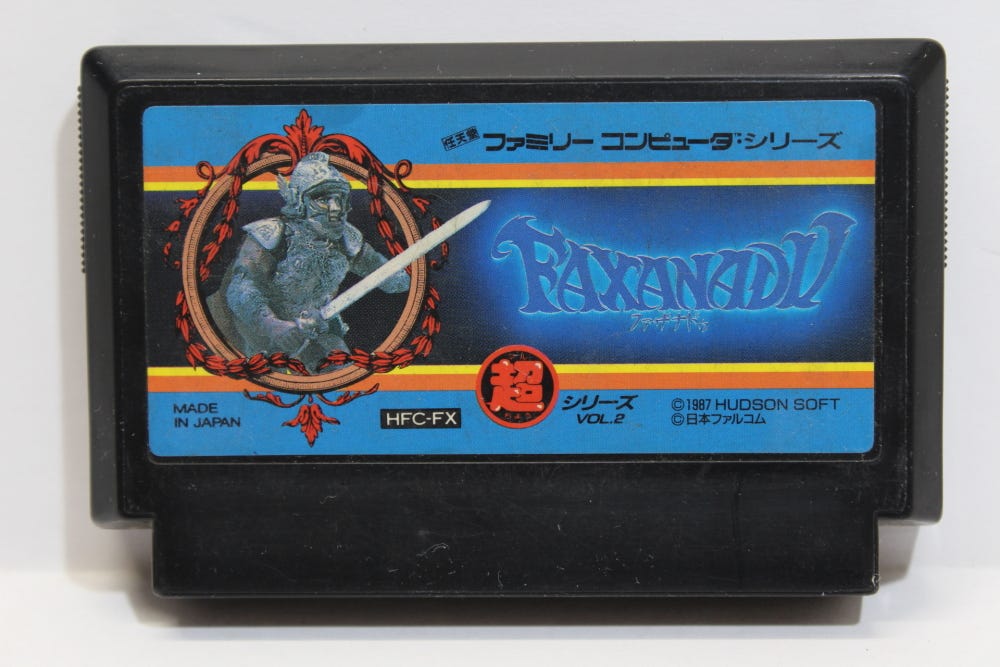
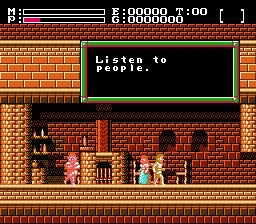
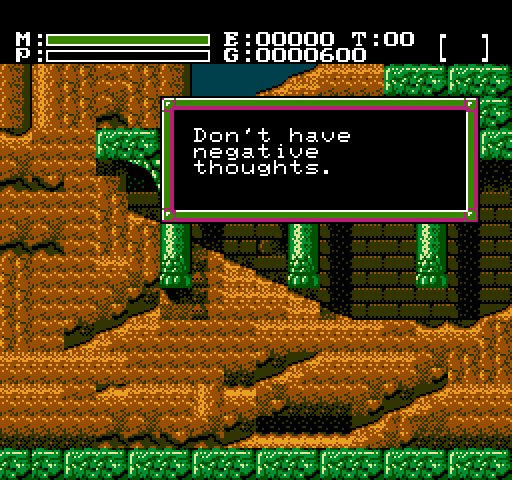
This is a great idea for a series. I was also a Nintendo kid in the late 80s/early 90s. (I even played a little Atari before getting my NES.) I don't remember this game at all, but it was certainly fun to read about.